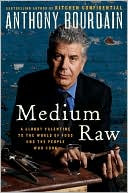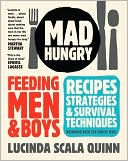Catching Fire: How Cooking Made Us Human
In Catching Fire, one of the most ambitious arguments about human evolution since Darwin's Descent of Man, renowned primatologist Richard Wrangham makes the claim that learning to cook food was the hinge on which human evolution turned. Eating cooked food, he argues, enabled us to evolve our large brains, and cooking itself became a primary focus of human social activity-in short, cooking made us the social, intelligent, and sexual species we are today. Path-breaking and provocative, Catching...
Search in google:
A startling new theory that the invention of cooking led to the creation of the human species The Washington Post - Jane Black Wrangham draws together previous studies and theories from disciplines as diverse as anthropology, biology, chemistry, sociology and literature into a cogent and compelling argument
Introduction: The Cooking Hypothesis 11 Quest for Raw-Foodists 152 The Cook's Body 373 The Energy Theory of Cooking 554 When Cooking Began 835 Brain Foods 1056 How Cooking Frees Men 1297 The Married Cook 1478 The Cook's Journey 179Epilogue: The Well-Informed Cook 195Acknowledgments 209Notes 213Bibliography 257Index 289
\ Jane BlackWrangham draws together previous studies and theories from disciplines as diverse as anthropology, biology, chemistry, sociology and literature into a cogent and compelling argument\ —The Washington Post\ \ \ \ \ Dwight GarnerCatching Fire is a plain-spoken and thoroughly gripping scientific essay that presents nothing less than a new theory of human evolution…[Wrangham] has delivered a rare thing: a slim book—the text itself is a mere 207 pages—that contains serious science yet is related in direct, no-nonsense prose. It is toothsome, skillfully prepared brain food.\ —The New York Times\ \ \ Publishers WeeklyContrary to the dogmas of raw-foods enthusiasts, cooked cuisine was central to the biological and social evolution of humanity, argues this fascinating study. Harvard biological anthropologist Wrangham (Demonic Males) dates the breakthrough in human evolution to a moment 1.8 million years ago, when, he conjectures, our forebears tamed fire and began cooking. Starting with Homo erectus-who should perhaps be renamed Homo gastronomicus-these innovations drove anatomical and physiological changes that make us "adapted to eating cooked food" the way "cows are adapted to eating grass." By making food more digestible and easier to extract energy from, Wrangham reasons, cooking enabled hominids' jaws, teeth and guts to shrink, freeing up calories to fuel their expanding brains. It also gave rise to pair bonding and table manners, and liberated mankind from the drudgery of chewing (while chaining womankind to the stove). Wrangham's lucid, accessible treatise ranges across nutritional science, paleontology and studies of ape behavior and hunter-gatherer societies; the result is a tour de force of natural history and a profound analysis of cooking's role in daily life. More than that, Wrangham offers a provocative take on evolution-suggesting that, rather than humans creating civilized technology, civilized technology created us. (June)\ Copyright © Reed Business Information, a division of Reed Elsevier Inc. All rights reserved.\ \ \ \ \ Kirkus ReviewsAn innovative argument that cooked food led to the rise of modern Homo sapiens. Wrangham (Biological Anthropology/Harvard Univ.; co-author: Demonic Males: Apes and the Origins of Human Violence, 1996, etc.), the curator of Primate Behavioral Biology at the Peabody Museum, begins by demolishing the fashionable raw-food movement. Despite claims that raw food is the natural human diet, the author finds no culture, however primitive, that doesn't cook. Studies show that a pure raw-food diet provides adequate nutrients but insufficient energy; subjects lose weight and half the women stop menstruating, a sign of malnutrition. Compared to apes, our gastrointestinal tracts (lips, mouth, jaws, teeth, stomach, colon) are tiny. The reason, he asserts, is that cooked food is calorie-dense, soft and easy to digest. Searching for and consuming food occupies most of the day for all primates except humans. Chimps spend six hours per day chewing, humans about one. Searching the fossil record, Wrangham describes earlier hominids, pinpointing the cooking revolution at the appearance of our direct ancestor, Homo erectus, in Africa 1.8 million years ago. "Cooking was responsible for the evolution of Homo erectus," he writes. Many anthropologists focus on its larger brain, larger body size and more stable upright posture. Wrangham emphasizes its smaller teeth and narrower rib cage and pelvis, which indicate a smaller gut. Sadly, the author concludes, modern, sedentary humans get fat, not because our bodies remain adapted to the constant threat of starvation but because we love our calorie-rich diet. Apes in captivity don't grow fat unless fed cooked food. Experts will debate Wrangham's thesis, but most readerswill be convinced by this lucid, simulating foray into popular anthropology. Author tour to Boston, Washington, D.C., San Francisco, Seattle\ \








